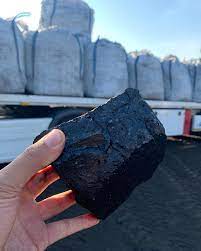Introduction: Gilsonite, a naturally occurring hydrocarbon resin, plays a vital role in the production and enhancement of asphalt. In the road construction industry, improving the durability and performance of asphalt is essential for building long-lasting and high-quality roads. As cities and countries worldwide invest in infrastructure and urban development, the need for advanced and high-performing materials becomes more critical. One such material is Gilsonite, which significantly improves the properties of asphalt, providing a cost-effective solution to the challenges faced in road construction. This blog will explore how Gilsonite contributes to asphalt modification, its benefits, and why it has become an essential ingredient in high-performance asphalt mixes.
What is Gilsonite?
Gilsonite is a naturally occurring bituminous material, often referred to as natural bitumen or asphaltite. Unlike traditional petroleum-based asphalts, Gilsonite is derived from a natural source, giving it unique qualities that make it ideal for various industrial applications, particularly in the road construction industry. Gilsonite is primarily extracted from surface mines, where it is found as a solid, black, and highly viscous material. Its chemical composition, which includes high levels of carbon and sulfur, makes it highly resistant to degradation and extremely durable, both crucial properties for asphalt modification.
Gilsonite has been used for over a century to enhance the properties of asphalt, improving the performance and lifespan of the roads it is used in. Over time, engineers and scientists have discovered that blending Gilsonite with traditional asphalt can yield even better results, especially in terms of road durability, heat resistance, and aging.
Why Gilsonite is a Superior Asphalt Modifier
Improved Performance in High-Temperature Conditions
One of the key benefits of adding Gilsonite to asphalt is its ability to withstand high temperatures. Asphalt, especially when exposed to constant sunlight or traffic, can begin to degrade and soften over time. This leads to issues such as ruts, cracks, and potholes. Gilsonite, with its high melting point and excellent heat resistance, enhances the asphalt’s ability to perform under extreme heat, making it less prone to deformation.
The addition of Gilsonite to asphalt increases its thermal stability, which is crucial for regions that experience hot climates. This improvement in heat resistance significantly extends the life of the pavement, reducing the need for frequent repairs and maintenance.
Enhanced Durability and Resistance to Wear
Another notable advantage of using Gilsonite in asphalt is the improvement in durability. When incorporated into asphalt mixes, Gilsonite enhances the material’s resilience to wear and tear. This means that roads constructed with Gilsonite-modified asphalt can withstand higher levels of traffic without experiencing significant deterioration. Heavy-duty vehicles, which would typically cause wear and tear on standard asphalt, are less likely to cause damage to roads containing Gilsonite.
In addition to wear resistance, impact resistance is another significant benefit. Gilsonite’s tough, solid nature provides asphalt with increased strength, allowing it to better withstand impacts from vehicle traffic and other environmental factors.
Improved Elasticity and Crack Resistance
Asphalt subjected to temperature fluctuations can expand and contract, leading to cracks and fissures. The addition of Gilsonite to asphalt enhances the material’s elasticity, allowing it to stretch and contract without cracking. This results in a flexible, long-lasting pavement that maintains its integrity even under the stress of temperature changes.
Gilsonite’s ability to improve crack resistance is particularly valuable in areas prone to extreme weather conditions. Roads in regions with significant seasonal changes, such as freeze-thaw cycles, benefit from the enhanced elasticity provided by Gilsonite-modified asphalt.
The Benefits of Gilsonite-Modified Asphalt
Longer Lifespan
The most obvious benefit of using Gilsonite in asphalt is its ability to significantly extend the lifespan of the road. Roads built with Gilsonite-modified asphalt can last longer before showing signs of wear, reducing the frequency of repaving. This not only saves money on maintenance and repairs but also reduces the disruption caused by roadwork projects. In the long term, using Gilsonite is a cost-effective way to improve the performance of road networks.
Improved Resistance to Aging
Asphalt, when exposed to UV rays, oxidation, and other environmental factors, can deteriorate over time, leading to a reduction in its performance and structural integrity. Gilsonite’s natural properties help combat this aging process by providing oxidation resistance and enhancing the material’s ability to maintain its performance over time.
The inclusion of Gilsonite in asphalt improves its resistance to aging by preventing the hardening and brittleness that typically occurs with traditional asphalt over the years. This is especially important for high-traffic roads, where constant exposure to sunlight and traffic can accelerate the aging process.
Cost-Effective Solution
While the upfront cost of using Gilsonite in asphalt may be slightly higher than traditional materials, the long-term cost savings make it a highly attractive option for road construction projects. The reduced need for maintenance, fewer repairs, and longer lifespan of Gilsonite-modified roads make it a cost-effective investment.
Additionally, the increased performance and durability of roads made with Gilsonite can lead to lower life-cycle costs compared to roads constructed with standard asphalt. This makes Gilsonite an ideal choice for large-scale infrastructure projects.
The Environmental Impact of Gilsonite-Modified Asphalt
One of the growing concerns in the construction industry is the environmental impact of materials used in road building. Traditional asphalt production involves the extraction of petroleum-based products, which can contribute to pollution and other environmental issues. However, because Gilsonite is a naturally occurring material, it is often considered more environmentally friendly compared to synthetic alternatives.
The use of Gilsonite-modified asphalt can help reduce the environmental impact of road construction by improving the sustainability of the infrastructure. Long-lasting roads that require fewer repairs mean that less energy and fewer materials are required for maintenance. This contributes to the sustainability of the road network, reducing overall resource consumption and emissions.
Conclusion
In conclusion, Gilsonite offers numerous benefits when used as an asphalt modifier. Its ability to enhance heat resistance, durability, elasticity, and resistance to aging makes it an invaluable material in the construction of high-performance roads. By incorporating Gilsonite into asphalt mixes, road construction professionals can significantly extend the lifespan of their projects while reducing the need for costly repairs and maintenance. Furthermore, the environmental benefits of using Gilsonite, such as reduced resource consumption and improved sustainability, make it an eco-friendly choice for modern road construction.
As cities and countries worldwide continue to invest in infrastructure, Gilsonite’s role in asphalt modification will only become more critical. By understanding and utilizing the unique properties of Gilsonite, engineers and construction professionals can create better, longer-lasting roads that stand up to the demands of modern traffic and harsh environmental conditions.



